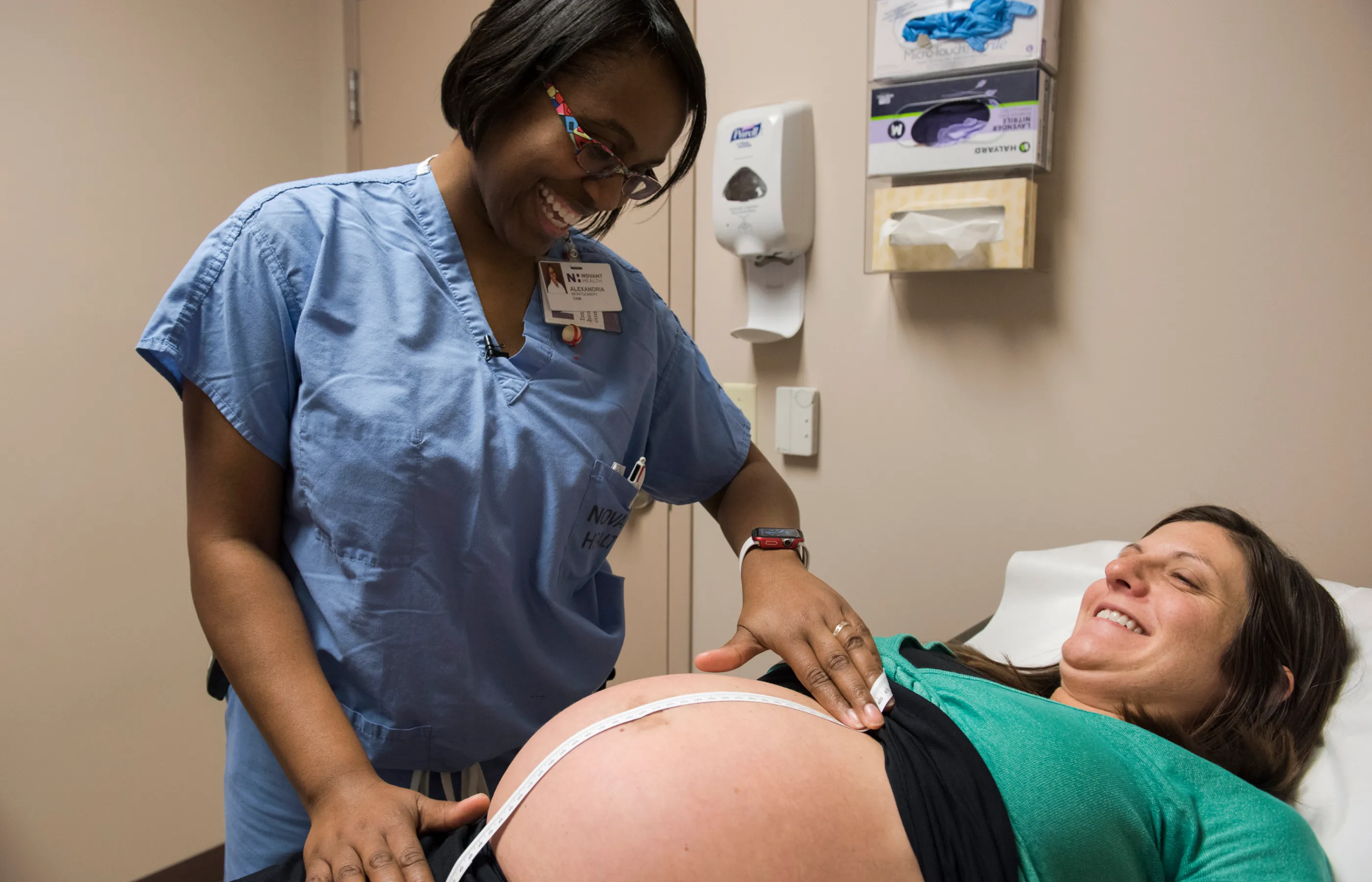Pregnancy
Complete, personalized maternity care
Whether you are planning to become pregnant, are expecting or just delivered your baby, our maternity experts will guide you through all stages of pregnancy. From early pregnancy symptoms and teenage pregnancy to childbirth and after delivery, we'll help you make decisions about your care.

Your first trimester
Finding out you are pregnant can bring many emotions from excitement to nervousness and many more. We know you may also have a lot of questions about what to expect. The experienced and compassionate care team of OB-GYNs, nurse-midwives and other care providers at Novant Health is here for you throughout all stages of this journey.
Watch for early pregnancy symptoms.
A missed period is often a sign of pregnancy. However, other factors like stress and exercise can cause you to miss or have a delayed period. If you're trying to get pregnant or wondering if you might be, watch for these early pregnancy symptoms, especially if they happen together:
- A missed period
- Nausea or vomiting, known as “morning sickness” (but can happen throughout the day)
- Sudden aversion to specific foods and smells
- Unusual tiredness or fatigue
- Having to go the bathroom more often
- Uncommon mood swings
When to see your provider
If you think you're pregnant, a home pregnancy test can help you get answers quickly and privately, but the results may not always be accurate. If you get a negative test but have other pregnancy symptoms, your test may have been too early. Take another test or see your gynecologist if you continue to have symptoms.
If your pregnancy test is positive, make an appointment with your provider, who can confirm your pregnancy, determine how far along you are and begin providing prenatal care for you and your developing baby.
The importance of prenatal care
Your healthcare provider will help guide you through the development stages of pregnancy, provide essential vitamin supplements, tests and other support you will need as your baby is growing. If you require additional testing or care during your pregnancy, the experts at Novant Health offer services for high-risk pregnancies. Our team of experts covers every aspect of reproductive health — from breastfeeding to nutritional and genetic counseling.
When to make your first prenatal visit
Most providers schedule your first prenatal appointment between weeks eight and 12 of your pregnancy, which is when your baby’s heartbeat can first be heard. Your doctor may need to do an ultrasound to see the heartbeat.
What happens at your first prenatal visit
At your first prenatal visit, you will have a physical exam and be asked about your health and family medical history. You will have lab work done and receive more information about your pregnancy. You will learn how your office visits will be scheduled and what to expect as you go through your pregnancy.
Prenatal care schedule
It is important to establish prenatal care in the first trimester (before 14 weeks) if possible. For a normal pregnancy, you can expect to visit your obstetrician once every four weeks through the 28th week, then more often the closer you get to your due date. The typical schedule is:
- Up to 28 weeks: one prenatal visit every three-five weeks.
- Weeks 28 through 36: one prenatal visit every two-three weeks.
- Weeks 36 to delivery:one prenatal visit at least weekly. Your provider may want to see you more frequently if you're at high risk of developing complications or experiencing any medical issues during pregnancy.

Caring for yourself during pregnancy
For many expectant parents, your primary focus will likely be on your developing baby, but it is just as important to take care of yourself. Maintaining healthy habits is good for you and your baby. Consider these valuable tips:
- Exercise: As long as your provider says it is safe, continue your usual exercise routine during pregnancy. If you're new to exercise, start slowly and build up to 30 minutes a day. Don't overdo it and avoid activities that risk a fall or injury.
- Diet: A balanced diet of dairy, grains and starches, vegetables, fruits and meats, fish and poultry is Avoid raw or undercooked meat and fish and unpasteurized dairy products.
- Medication: If you currently take any medications, make sure to talk to your provider and discuss how to manage any medications you may need to take regularly.
Pregnancy side effects
Pregnancy can have side effects ranging from uncomfortable to potentially dangerous. Common health side effects of pregnancy may include:
- Anemia
- High blood pressure
- Diabetes
- Severe pregnancy-related nausea
- Urinary tract infection (UTI)
If you experience pain or concerning discomfort, alert your healthcare provider right away.
Getting proper emotional support
You may experience depression during your pregnancy, especially if you have a pre-existing history. If you experience sadness or lose interest in activities you once enjoyed, speak to your provider about your treatment options.
Prepare for Your Baby's Arrival
Planning ahead will help you feel more relaxed and ready for your baby’s arrival. Our Birth Preparation Guide offers valuable information for you and your loved ones as you prepare for the big day.


We're here to help you plan for childcare.
Even though it will be months before you meet your new baby, go ahead and start planning for childcare as soon as you know you're pregnant. If you plan to use a day care center, the waiting lists for childcare centers can be years long. You also want to make sure you're budgeting accordingly.
We're by your side with everything you need to know about finding childcare.

Navigating teen pregnancy
While prenatal care is important during any pregnancy, it's especially critical for pregnant teens. If you think you may be pregnant or have recently had a positive pregnancy test, contact a healthcare provider right away; consider confiding in a parent or trusted adult and ask them to help you make an appointment. Your provider will confirm if you're pregnant, determine how far along you are and help guide you on your options and next steps. The sooner you seek out support, the sooner you can get information on pregnancy options and medical advice on keeping yourself and your baby healthy.
Teen pregnancy risk and support
All pregnancies carry some risk. At your age, pregnancy can carry a slightly higher risk for certain conditions. These include:
- High blood pressure (also known as pregnancy-induced hypertension)
- Preeclampsia — a dangerous medical condition caused by high blood pressure combined with high protein levels in the urine that can cause swelling in the hands, feet and legs or lead to seizures, known as eclampsia.
We are here to provide the extra support, resources and guidance you need to have the safest, healthiest experience possible.
High-risk pregnancy
If you have medical or family history that could make your pregnancy be considered high-risk, you may need a maternal-fetal specialist on your team to help monitor you more closely throughout pregnancy to reduce the risk of complications.

